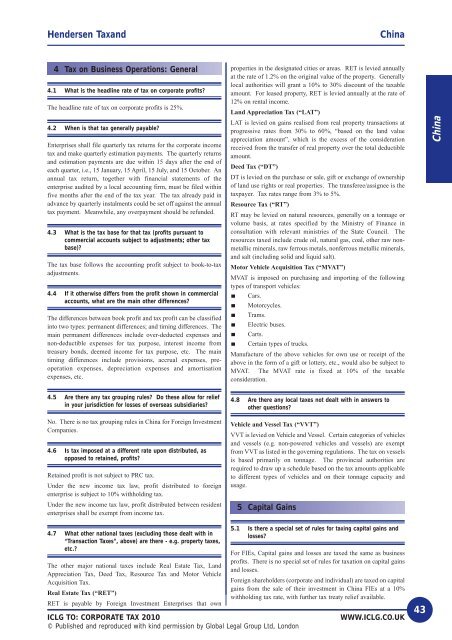Corporate Tax 2010 - BMR Advisors
Corporate Tax 2010 - BMR Advisors
Corporate Tax 2010 - BMR Advisors
Create successful ePaper yourself
Turn your PDF publications into a flip-book with our unique Google optimized e-Paper software.
Hendersen <strong>Tax</strong>and<br />
China<br />
4 <strong>Tax</strong> on Business Operations: General<br />
4.1 What is the headline rate of tax on corporate profits<br />
The headline rate of tax on corporate profits is 25%.<br />
4.2 When is that tax generally payable<br />
Enterprises shall file quarterly tax returns for the corporate income<br />
tax and make quarterly estimation payments. The quarterly returns<br />
and estimation payments are due within 15 days after the end of<br />
each quarter, i.e., 15 January, 15 April, 15 July, and 15 October. An<br />
annual tax return, together with financial statements of the<br />
enterprise audited by a local accounting firm, must be filed within<br />
five months after the end of the tax year. The tax already paid in<br />
advance by quarterly instalments could be set off against the annual<br />
tax payment. Meanwhile, any overpayment should be refunded.<br />
4.3 What is the tax base for that tax (profits pursuant to<br />
commercial accounts subject to adjustments; other tax<br />
base)<br />
The tax base follows the accounting profit subject to book-to-tax<br />
adjustments.<br />
4.4 If it otherwise differs from the profit shown in commercial<br />
accounts, what are the main other differences<br />
The differences between book profit and tax profit can be classified<br />
into two types: permanent differences; and timing differences. The<br />
main permanent differences include over-deducted expenses and<br />
non-deductible expenses for tax purpose, interest income from<br />
treasury bonds, deemed income for tax purpose, etc. The main<br />
timing differences include provisions, accrual expenses, preoperation<br />
expenses, depreciation expenses and amortisation<br />
expenses, etc.<br />
properties in the designated cities or areas. RET is levied annually<br />
at the rate of 1.2% on the original value of the property. Generally<br />
local authorities will grant a 10% to 30% discount of the taxable<br />
amount. For leased property, RET is levied annually at the rate of<br />
12% on rental income.<br />
Land Appreciation <strong>Tax</strong> (“LAT”)<br />
LAT is levied on gains realised from real property transactions at<br />
progressive rates from 30% to 60%, “based on the land value<br />
appreciation amount”, which is the excess of the consideration<br />
received from the transfer of real property over the total deductible<br />
amount.<br />
Deed <strong>Tax</strong> (“DT”)<br />
DT is levied on the purchase or sale, gift or exchange of ownership<br />
of land use rights or real properties. The transferee/assignee is the<br />
taxpayer. <strong>Tax</strong> rates range from 3% to 5%.<br />
Resource <strong>Tax</strong> (“RT”)<br />
RT may be levied on natural resources, generally on a tonnage or<br />
volume basis, at rates specified by the Ministry of Finance in<br />
consultation with relevant ministries of the State Council. The<br />
resources taxed include crude oil, natural gas, coal, other raw nonmetallic<br />
minerals, raw ferrous metals, nonferrous metallic minerals,<br />
and salt (including solid and liquid salt).<br />
Motor Vehicle Acquisition <strong>Tax</strong> (“MVAT”)<br />
MVAT is imposed on purchasing and importing of the following<br />
types of transport vehicles:<br />
Cars.<br />
Motorcycles.<br />
Trams.<br />
Electric buses.<br />
Carts.<br />
Certain types of trucks.<br />
Manufacture of the above vehicles for own use or receipt of the<br />
above in the form of a gift or lottery, etc., would also be subject to<br />
MVAT. The MVAT rate is fixed at 10% of the taxable<br />
consideration.<br />
China<br />
4.5 Are there any tax grouping rules Do these allow for relief<br />
in your jurisdiction for losses of overseas subsidiaries<br />
No. There is no tax grouping rules in China for Foreign Investment<br />
Companies.<br />
4.6 Is tax imposed at a different rate upon distributed, as<br />
opposed to retained, profits<br />
Retained profit is not subject to PRC tax.<br />
Under the new income tax law, profit distributed to foreign<br />
enterprise is subject to 10% withholding tax.<br />
Under the new income tax law, profit distributed between resident<br />
enterprises shall be exempt from income tax.<br />
4.8 Are there any local taxes not dealt with in answers to<br />
other questions<br />
Vehicle and Vessel <strong>Tax</strong> (“VVT”)<br />
VVT is levied on Vehicle and Vessel. Certain categories of vehicles<br />
and vessels (e.g. non-powered vehicles and vessels) are exempt<br />
from VVT as listed in the governing regulations. The tax on vessels<br />
is based primarily on tonnage. The provincial authorities are<br />
required to draw up a schedule based on the tax amounts applicable<br />
to different types of vehicles and on their tonnage capacity and<br />
usage.<br />
5 Capital Gains<br />
4.7 What other national taxes (excluding those dealt with in<br />
“Transaction <strong>Tax</strong>es”, above) are there - e.g. property taxes,<br />
etc.<br />
The other major national taxes include Real Estate <strong>Tax</strong>, Land<br />
Appreciation <strong>Tax</strong>, Deed <strong>Tax</strong>, Resource <strong>Tax</strong> and Motor Vehicle<br />
Acquisition <strong>Tax</strong>.<br />
Real Estate <strong>Tax</strong> (“RET”)<br />
RET is payable by Foreign Investment Enterprises that own<br />
ICLG TO: CORPORATE TAX <strong>2010</strong><br />
© Published and reproduced with kind permission by Global Legal Group Ltd, London<br />
5.1 Is there a special set of rules for taxing capital gains and<br />
losses<br />
For FIEs, Capital gains and losses are taxed the same as business<br />
profits. There is no special set of rules for taxation on capital gains<br />
and losses.<br />
Foreign shareholders (corporate and individual) are taxed on capital<br />
gains from the sale of their investment in China FIEs at a 10%<br />
withholding tax rate, with further tax treaty relief available.<br />
WWW.ICLG.CO.UK 43
















